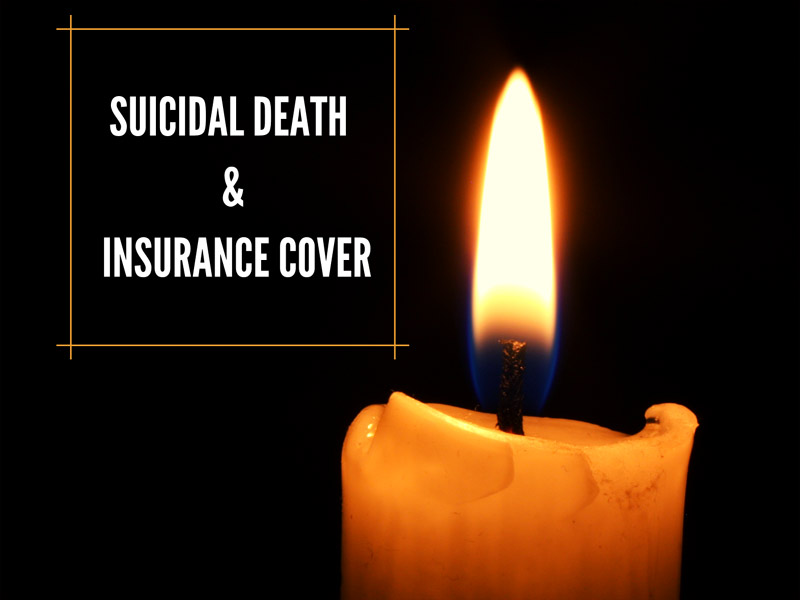Do term insurance plans cover death by suicide?
Sanjay was a product manager with a leading IT MNC in Mumbai. At 31 years, he was the youngest in the company to land this position. His company provided him with the best of facilities, which included a handsome salary, paid accommodation, travel allowances, etc. Sanjay opted to buy a term insurance policy to safeguard his family from uncertainties and protect their lifestyle.
In the year 2020, while it looked as if things were all going well, the COVID-19 pandemic struck, making businesses tumble. Sanjay’s company, too, was hit hard and had to lay him off along with many senior employees to save costs. Sanjay couldn’t find proper employment for months due to continuous lockdown restrictions. He was battling depression because of this and was reaching out to his friends for help. Despite all the efforts made by his dear and near ones, Sanjay committed suicide in 2020 due to prolonged depression. His family was shocked due to the sudden turn of events as he was the only earning member of the family, and with him no more, they were not able to think of the future.
Knowing about his term plan, Sanjay’s wife sent the death benefit claim to the insurance company, who eventually paid the entire death benefit since suicide happened after 12 months from the policy start date.
India ranks amongst the top countries in suicidal deaths recorded every year, says the World Health Organization (WHO). According to the National Crime Records Bureau (NCRB) data for the year 2019, an average of 381 deaths was registered daily due to suicide, thereby taking the yearly total to 1,39,123 fatalities.
Death may not be the favorite topic of discussion for many, but it is one of the strong reasons for making sure their families are protected financially in the future. A term insurance policy is the best financial product that provides financial stability for the family in case the insured person encounters death. For a nominal monthly or annual payment, the insurance company promises to pay the death benefit to your beneficiaries that will help them to tackle the challenges of daily life.
Is suicide covered in term insurance?
Yes, term insurance plans do cover deaths by suicide which was not the case before 2014. Unfortunately, people typically think that insurance policies do not cover death by suicide. This practice was valid until the year 2014, wherein the insurance companies did not consider suicidal death as natural or accidental, leading to rejection of insurance claims.
With the increased awareness of mental health over the years and understanding of suicidal thoughts in the current generation, insurers have brought in suicide cover in term plans, so they are aligned with the public opinion.
The death claims due to suicide of the policyholder are classified by insurance companies in two phases: before January 2014 and after January 2014. To know more in detail about this, read below:
For plans issued before January 1, 2014: For all the insurance policies issued before January 1, 2014, it is mentioned that if the insured person dies by committing suicide within 12 months from the policy start date, the policy is considered to be void and no claim is approved. But, if the insured dies by suicide after one year of the issuance of the policy, the claim is accepted, and the death benefit is paid to the nominee.
For plans issued after January 1, 2014: Following the amendments made to the suicide clause in 2014, insurance companies started considering claims due to such deaths differently. On receiving a claim for suicidal death, insurance providers will pay 80% of the premium paid to the nominee if the policyholder commits suicide within one year of the policy start date. In the case of ULIP’s, the policy’s total value is paid to the nominee if the insured commits suicide within 12 months of the policy’s start.
These changes were brought into force so the policyholder’s family can cope up with the loss of the insured, pick themselves up emotionally, and continue to lead their lives without any financial worries.
List of Deaths which is not covered in a term plan
You must know the list of deaths that are not covered under a term insurance policy as claim requests sent in these cases shall often get rejected by the insurance company.
- Natural Calamities: If the policyholder dies in a natural calamity such as earthquakes, floods, cyclones, tsunami, etc., it is not covered under the term insurance plan unless any particular rider is taken to address this purpose.
- HIV/ AIDS: If the policyholder dies due to HIV/ AIDS or any other STDs (Sexually Transmitted Diseases) during the policy term, the claim request is not covered by the term plan.
- Sports Injuries: If the death of a policyholder happens due to participation in any adventure sport or hazardous activities such as car/ bike racing, river rafting, bungee jumping, paragliding, hiking, etc. the term insurance plan does not cover it.
- Substance abuse or Addiction: If the insured person dies due to alcohol abuse, drug overdose, or consumption of banned narcotics, such claims are bound to be rejected by the insured.
- Homicide: If the policyholder of a term plan is murdered or is found to be involved in some criminal activity, then no claim shall be paid by the insurance company unless proven otherwise.
- Childbirth: If the policyholder’s death happens due to pregnancy complications during childbirth, the insurer shall reject the claim request citing that the death is not covered under the policy terms.
The answer for whether term insurance covers natural death should be clearer now with the scenarios explained above. India is witnessing an alarming increase in suicidal deaths that is attributed to various reasons, but in the end, their family members take an emotional beating. In such situations, a term insurance plan is assured to protect the family’s future financial needs.





























